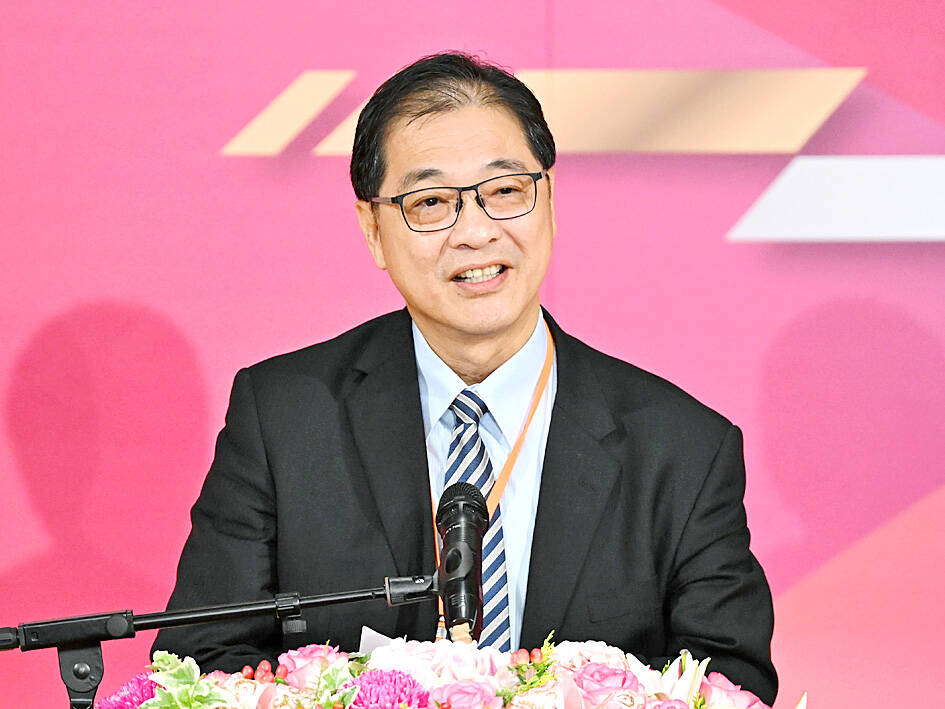The 37 prisoners on death row who have exhausted their appeals are to remain in prison, Minister of Justice Cheng Ming-chien (鄭銘謙) said on Tuesday in response to a question by Chinese Nationalist Party (KMT) Legislator Wu Tsung-hsien (吳宗憲) at the legislature in Taipei.
The 37 would remain in prison, as per the Prison Act (監獄行刑法), even though the Constitutional Court on Sept. 20 ruled that the death penalty could only be applied to “the most serious” premeditated murders or premeditated crimes resulting in death.
The ruling established a high threshold to significantly restrict the use of capital punishment in Taiwan.

Photo: Chen Yi-kuan,Taipei Times
Wu asked whether the death sentences of the 37 prisoners would be revoked, and if so, whether they would be released.
Cheng said the death sentences would not be changed and the prisoners would not be released, unless the Supreme Court reviewed their individual cases and decided to issue new rulings or send the cases back to a lower court for re-examination.
For the Supreme Court to even consider doing so, it would require the head prosecutor of the Supreme Prosecutors’ Office to file extraordinary appeals for those prisoners, he said.
The Supreme Prosecutors’ Office has said it would do so for two of the inmates — Chen Yi-lung (陳憶隆) and Huang Chun-chi (黃春棋) — because the rulings underlying their death sentences were ruled unconstitutional by the Constitutional Court on Sept. 20.
The two, convicted of kidnapping and murdering a businessman surnamed Huang (黃) in 1995, were sentenced to death based on an already defunct Criminal Code provision for a “mandatory death penalty.”
As for the remaining 35 prisoners — all of whom have been sentenced to death for homicide and most of whom have been in prison for more than a decade — the Supreme Prosecutors’ Office said it would examine each case before determining its next step.
Cheng said that the prisoners would only be released if a court later ruled that they were not guilty.
“We must have confidence in the courts,” Cheng said, adding that a release scenario was unlikely.
Wu, who is a prosecutor-turned-lawmaker, asked Cheng whether time spent behind bars would be counted as time served if their penalties were changed to fixed-term sentences.
Cheng ruled out such a possibility, citing the Criminal Code.
The KMT legislative caucus has criticized the ruling by the Constitutional Court as abolishing the death penalty in all but name.
The caucus held a news conference on Tuesday in a bid to pressure the Ministry of Justice into carrying out the sentences of the 37 prisoners on death row.

An essay competition jointly organized by a local writing society and a publisher affiliated with the Chinese Communist Party (CCP) might have contravened the Act Governing Relations Between the People of the Taiwan Area and the Mainland Area (臺灣地區與大陸地區人民關係條例), the Mainland Affairs Council (MAC) said on Thursday. “In this case, the partner organization is clearly an agency under the CCP’s Fujian Provincial Committee,” MAC Deputy Minister and spokesperson Liang Wen-chieh (梁文傑) said at a news briefing in Taipei. “It also involves bringing Taiwanese students to China with all-expenses-paid arrangements to attend award ceremonies and camps,” Liang said. Those two “characteristics” are typically sufficient

The brilliant blue waters, thick foliage and bucolic atmosphere on this seemingly idyllic archipelago deep in the Pacific Ocean belie the key role it now plays in a titanic geopolitical struggle. Palau is again on the front line as China, and the US and its allies prepare their forces in an intensifying contest for control over the Asia-Pacific region. The democratic nation of just 17,000 people hosts US-controlled airstrips and soon-to-be-completed radar installations that the US military describes as “critical” to monitoring vast swathes of water and airspace. It is also a key piece of the second island chain, a string of

A magnitude 5.9 earthquake that struck about 33km off the coast of Hualien City was the "main shock" in a series of quakes in the area, with aftershocks expected over the next three days, the Central Weather Administration (CWA) said yesterday. Prior to the magnitude 5.9 quake shaking most of Taiwan at 6:53pm yesterday, six other earthquakes stronger than a magnitude of 4, starting with a magnitude 5.5 quake at 6:09pm, occurred in the area. CWA Seismological Center Director Wu Chien-fu (吳健富) confirmed that the quakes were all part of the same series and that the magnitude 5.5 temblor was

The Central Weather Administration has issued a heat alert for southeastern Taiwan, warning of temperatures as high as 36°C today, while alerting some coastal areas of strong winds later in the day. Kaohsiung’s Neimen District (內門) and Pingtung County’s Neipu Township (內埔) are under an orange heat alert, which warns of temperatures as high as 36°C for three consecutive days, the CWA said, citing southwest winds. The heat would also extend to Tainan’s Nansi (楠西) and Yujing (玉井) districts, as well as Pingtung’s Gaoshu (高樹), Yanpu (鹽埔) and Majia (瑪家) townships, it said, forecasting highs of up to 36°C in those areas